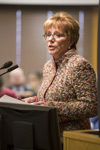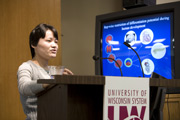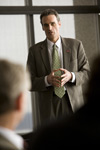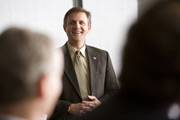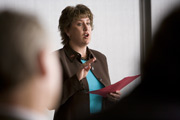University of Wisconsin System President Kevin P. Reilly today accepted a new policy designed to protect segregated university fees and preserve a system where students and administrators share responsibility for distributing those funds.
A committee of UW System students and administrators developed the policy, based on extensive research and broad public input. UW System President Kevin P. Reilly accepted the recommended policy, which provides clear-cut criteria for recognition of official student organizations, and uniform guidelines for how those organizations spend university funds.
Speaking on behalf of Reilly at a meeting of the UW System Board of Regents, UW System Executive Senior Vice President Don Mash noted that Wisconsin statutes adopted in 1971 first provided the opportunity for students to have a shared role in the distribution of university funds used to support activities of student organizations. Those laws specify that the campus chancellors must be consulted as part of the shared governance process.
“Statutes make clear that the chancellor is responsible for the administration of all funds used at his or her campus. The statute provides for student involvement, but does not relieve the chancellors of their responsibilities for fiscal oversight,” said Mash.
Mash emphasized how university leaders have been careful to consider many comments and suggestions provided by students, administrators, legislators, and others.
“We have been committed to a broad, collaborative process in reviewing this matter. We are no less committed to fiscal accountability, sound policy and good management. Whether we’re handling tuition revenues, auxiliary funds, state GPR dollars, federal grants, or private donations, every arm of the UW System must expend those dollars in accordance with established rules, laws, policies, and procedures. Taxpayers, students, parents, and legislators expect nothing less.” said Mash.
Linda Bunnell, UW-Stevens Point chancellor and member of the Committee to Review Allocable Segregated Fee Policies, presented the Regents with the committee’s findings. She described the group as balanced with an equable amount of administrators and students.
“In a short period of time, [we] received wonderful feedback from each of the campuses,” said Bunnell. The 14 UW System chancellors expressed unanimous support for the policy in a letter to Reilly. Student leaders and student government organizations representing UW-Eau Claire, UW-Oshkosh, UW-Platteville, UW-River Falls, UW-Stout, and UW-Superior also endorsed the policy.
Student government organizations from five of the four-year universities and one of the two-year UW Colleges expressed opposition to any new oversight over the distribution of segregated fees.
Many students, especially those from UW-Madison, expressed concern about the ability to use segregated university fees to pay for contractual services. The new policy provides a mechanism for this use, when there is a substantial need for services that cannot be provided by the UW campus. If administrators and students agree that contractual services are needed, those contracts must be struck in accordance with state procurement processes.
Similarly, the new policy allows for segregated fees to be used to lease non-university facilities for use by recognized student organizations, if there is a lack of available space on campus. Students and chancellors must agree on this need, and the lease must be granted by the Wisconsin Department of Administration in accordance with state statutes.
“This is not a brand new issue for the Madison campus,” said UW-Madison Provost Patrick Farrell. “It has been under discussion for quite some time.”
Following the announcement, Regent Jeffrey Bartell engaged the Regents in a discussion concerning his reservations about the President’s approval.
“I think the policy needs more work,” advised Bartell. “I don’t think this is the best policy we can adopt as the Board of Regents.”
Regent David Walsh supported Reilly’s decision. “This [segregated fees issue] is getting big time out of hand and it will get out of hand unless we focus in on some issues.”
Walsh’s opinion was seconded by Regent Danae Davis who expressed the importance of supporting all the chancellors.
“I want to let it work,” said Davis.
Farrell further stressed that the policy would only significantly impact two student groups at UW-Madison.
Mash assured the Board that the policy is “a step in the right direction.”
“This policy will not harm the educational experience of UW students,” said Mash. “Rather, it will preserve a proud tradition of shared governance, while demanding equal levels of accountability for all university funds, regardless of how those funds were obtained.”
Regents hear from UW-Madison researchers on stem cell breakthrough
The Board of Regents heard a presentation on the recently announced stem cell breakthrough by Dr. Junying Yu, UW-Madison researcher, and Carl Gulbrandsen, managing director of the Wisconsin Alumni Research Foundation (WARF)
“We always want to bring good news to the Regents, and this is really good news,” said Gulbrandsen.
Yu, along with others at the James Thomson Lab, discovered a method for converting common cells into stem cells. They currently have eight stem cell lines created from skin cells, said Yu.
She explained that the finding now allows researchers ways to better understand diseases and thus create more efficient ways of dealing with them.
Although the research requires additional studies, many see the discovery as a step in the right direction in quelling major ethical concerns associated with stems cells. Many other researchers throughout the world are currently not far behind in their discoveries, provoking Yu to urge the Regents and community for continued research funding to further the UW System’s research efforts.
“It is very difficult for us to make the same achievement for future work,” explained Yu. “This technology is very simple and hundreds are already joining.”
This breakthrough has “increased the competition for Wisconsin,” said Gulbrandsen. “But we have the head start here.”
The presentation underlined the UW System’s belief that a key factor to increasing the state’s economic growth lies in innovative research.
“We are as proud of this as if we had won the best Rose Bowl game,” said Gulbrandsen.
Report on Fall 2007 Enrollment
Sharon Wilhelm, associate vice president, announced enrollment at an all-time high with a 2.1 percent growth from last year. UW-Milwaukee led the way with an increase in both enrollment and new freshmen.
Her report continued with news that students of color now comprise 10 percent of the System’s student body and the gender gap is slowly closing with increases in male enrollments.
“The gender gap is the smallest it’s been in over a decade,” said Wilhelm.
Other news included the significant increase in veterans of war enrollment with a gain of nearly 1,500 students in just two years.
Committee advances new sick leave policy for UW System faculty and academic staff
In a presentation to the Business, Finance and Audit Committee today, Regent Thomas Loftus described the new sick leave policy as a “simple issue at hand” as both he and Al Crist, UW System associate vice president for human resources and workforce diversity, presented resolutions aimed at better managing the current sick leave policy.
The impetus for the policy arose when the nonpartisan Legislative Audit Bureau found that UW employees may be abusing the current sick leave policy to convert unused sick time into post-retirement healthcare coverage. The audit revealed that 77 percent of UW professors along with 45 percent of UW employees reported using no sick leave. This was a significant difference from the 17 percent of employees in other state positions reporting the same.
Loftus described the move as a way of “keeping the faith with the people of this state.”
To demonstrate the UW System’s promise of efficiently using tax-payers dollars, faculty and academic staff will be required to report any sick leave, even if their classes or office hours are covered by another staff member. This change will affect 18,000 employees and will become effective Jan. 1, 2008.
A final addition to the resolution includes requiring employees to file a monthly report on leave usage, even if they did not use any sick time. If an employee fails to do so, they will be unable to receive the full amount of sick days that are convertible to healthcare credits.
Loftus reiterated the importance of maintaining the value of sick leave. “Generations struggled for this right to take off when they are sick and not lose their jobs.”
The Business, Finance and Audit Committee approved the three resolutions, which will be acted upon by the full Board of Regents tomorrow.
Regents review the steps necessary to alleviate costly textbook purchases
At its May 2007 meeting, the Board of Regents Business, Finance, and Audit Committee reviewed a report entitled “Textbook Costs in Higher Education” in a move to find more cost-effective ways to combat rising textbook prices.
In an informational presentation today, the Committee was presented with strategies enacted by each institution in an attempt to control textbook costs and additional plans they anticipate to adopt in the future.
Strategies included textbook rental programs, library reserves, and textbook swap markets, similar to the student organization currently within the UW-Madison College of Engineering.
A third-year Madison student affiliated with the on-campus group Wisconsin Student Public Interest Research Group added that textbook publishers are also “culpable for rising costs.”
Other ideas suggested by many UW institutions include instructors’ enhanced awareness of their impact on textbook costs, students’ knowledge of alternatives available to them, and institutions potential delivery methods and business models.
Regent Elizabeth Burmaster echoed the group’s sense of urgency talking about her own daughter’s experience with expensive textbooks.
“This issue hits home,” said Burmaster.
The Committee will review the situation again in six months following more implementation of strategies and increased education amongst students and faculty.
UW-La Crosse demonstrates student, faculty, staff and legislative support for initiative
The Business, Finance, and Audit Committee approved unanimously the UW-La Crosse Growth, Quality, and Access Initiative after a strong presentation by UW-La Crosse Chancellor Joe Gow.
Support for this plan, which will phase-in a differential tuition for incoming UW-La Crosse students, was echoed by students, faculty and academic staff leaders, business representatives and elected leaders.
Assembly Speaker Michael Huebsch, Rep. Jennifer Shilling, and a staff member from Senator Dan Kapanke’s office spoke in support of the plan, which comes as the number of applicants to UW-La Crosse continues to increase. With more than two applicants for every available slot in the freshman class, Gow fears that many will see the school’s 64-percent acceptance rate as “elitist.”
“I still think of our school as a good ol’fashioned, comprehensive school,” said Gow.
If passed by the full board tomorrow , the plan will grow undergraduate enrollments by 500 students over the next three to five years. Additional revenues will allow the institution to hire 75 additional faculty and 20 additional staff over the same time period.
Shilling sees the move as “providing a benefit to the entire La Crosse community.” “Ninety-five new jobs means more jobs in our community,” urged Shilling.
Huebsch seconded the importance of providing the school with the funds necessary to quell problems that are putting the quality of instruction in jeopardy. He reiterated that the school should be a “tremendous product at a good price.”
While Huebsch joked about hurdles from Republicans in the Legislature, he gave strong credit to Gow for heeding the advice.
“Every time I’ve asked [Gow] to clear these hurdles, he’s responded,” said Huebsch.
UW-La Crosse Student Senate President Fred Ludwig, voiced what he described as “unprecedented support” for a proposal that has had solid student input.
Regent Peggy Rosenzweig offered her strong support, lauding Gow for bringing the coalition with him to support the proposal.
“You really did your homework, and I commend you for that,” she said, reiterating her desire to keep affordability a focus for the UW System.
Shilling reassured the committee that the plan ensures financial help for those that require it. “We couldn’t go forward without financial aid,” said Shilling.
Regent Eileen Connolly-Keesler also questioned whether approval of the Initiative would “open the door” for other institutions.
Gow described the situation at UW-La Crosse as “being pretty unique,” pointing out that out of the masters institutions in the Midwest, UW-La Crosse is currently rated as the highest student-to-teacher ratio at 24:1.
If passed by the full board tomorrow and utilized, the Initiative is slated to have a review in five years. That was partly, Gow offered, in response to concerns raised by legislators, which Gow thought was a fair request.
Regent President Mark Bradley, while not a member of the committee, stayed for the presentation, and offered concluding remarks that praised the legislative support behind the initiative. He articulated that it was unprecedented to have the Speaker, and two other legislative leaders, work with the Regents in this manner.
In other business, the Business, Finance and Audit Committee:
- Approved UW-Parkside’s food service contract extension; the one-year extension will allow completion of a $25 million renovation project of the campus student union facilities;
- Approved a resolution adopting a new investment policy statement presented by Trust Funds Director Doug Hoerr;
- Approved the Educational Broadband Services Excess Capacity use and Royalty Agreement with Clearwire Spectrum Holdings II, LLC; the agreement is expected to generate royalties that will support academic studies at UW-Milwaukee and will help the school to cover its share of the $25 million lapse in the 2007-09 biennium;
- Approved the revised pay plan for UW System faculty and academic staff; the plan provides a 2% general wage adjustment effective the pay period following the approval and also sets guidelines for distribution among UW institutions;
- Discussed the updated activities related to the Advantage Wisconsin strategic planning effort;
- Discussed the audit projects recently completed by UW System institutions, as well as a plan for audits in 2008.
Education Committee learns more about UW-Madison’s preparations for reaccreditation
UW-Madison is in the midst of a broad campus self-assessment to prepare for reaccreditation by the Higher Learning Commission, the Education Committee learned Thursday. Committee members heard from Patrick Farrell, campus provost, in a presentation titled, “A Great Public University in a Changing World: Campus Self-Study in Preparation for Reaccreditation by the Higher Learning Commission.”
Although universities are required to be reaccredited every ten years, Farrell said that UW-Madison has taken a more forward-looking approach during its most recent reaccreditations. Nancy Matthews, associate professor at UW-Madison’s Nelson Institute of Environmental Studies, has headed up the process, which began last spring with a three-question survey sent to students, faculty, staff, and alumni. Out of 22 main ideas that emerged, six overall themes emerged to guide the self-study.
“Shaping the Global Agenda – This is a big one. We’re in a unique position to shape…key issues….What contribution do we intend to make?” asked Farrell.
Farrell also pointed out that each term’s definition in the phrase “great public research university” may change in ten years and the campus self-study goal is to anticipate these changes.
More information on UW-Madison’s reaccreditation process is available at online.
Committee revisits Advantage Wisconsin
Following a discussion last month with members of the UW System Strategic Framework Think Tank on Preparing Students, the Education Committee this month engaged in a discussion with representatives from the Collaboration Think Tank. Larry Rubin, assistant vice president for academic and student services, said the team outlined five focus areas dealing with business and industry partnerships, academic programming collaborations, international exchanges and global awareness, student access to college, and stronger relationships with state government leaders.
Regent Mary Quinette Cuene corroborated the importance of regional economic development partnerships, saying that it was a theme that came out of the Nov. 27 Advantage Wisconsinstatewide listening sessions hosted by UW-Extension.
Regent Loftus brought up the importance of distinguishing between issues that warrant giving “more authority to campuses and chancellors” and those that make sense being centralized. He also suggested looking for ways to encourage UW System faculty to increase engagement at the legislative level.
AODA Committee Reports
The Education Committee heard a report from the UW System Alcohol and Other Drug Abuse Committee, chaired by UW-Stevens Point Chancellor Linda Bunnell. One of the Committee’s major initiatives has been the development of a common assessment study or survey.
First administered to undergraduate students in the spring of 2005, the survey shows that binge drinking is declining among UW students but still exceeds national averages. “Wisconsin is a leader in tackling an issue like this,” said Bunnell.
Committee members heard a presentation by Colleen Howes, marketing specialist for UW Colleges, on the survey methods and results. They also heard a second presentation by Aaron Brower, vice provost for teaching and learning and professor of social work at UW-Madison, who spoke about UW-Madison’s efforts to reduce the consequences of high-risk drinking in what’s known as the PACE Project.
Bunnell emphasized that engaging student governance groups is critical because “students have the most influence over other students to reduce risk behavior.”
“Some say this is one of the most critical issues facing college students today. Please hold the chancellors accountable…[They] have a great role to play in setting the tone to address alcohol and drug abuse,” said Bunnell.
In other business, the Education Committee:
- Heard a discussion about a potential new degree offering, the doctor of nursing practice;
- Deferred a discussion regarding a process for developing five-year UW System campus academic plans until February;
- Approved the establishment of the Regent Diversity Awards;
- Heard a summary of the sabbatical program and assignments being given to UW System faculty for 2008-09;
- Approved of a UW School of Medicine and Public Health appointment to the Oversight and Advisory Committee of the Wisconsin Partnership Fund for a Healthy Future; and
- Authorized UW-Extension to recruit a provost/vice chancellor.
Physical Planning and Funding Committee
At the Physical Planning and Funding Committee meeting, Assistant Vice President David Miller reported that the Building Commission approved about $135 million for projects at the commission’s November meeting. The funding breakdown for those projects is $63 million of general fund supported borrowing, $10 million of program revenue, and $62 million of gift and grant funds.
The committee discussed how food service contracts impact facilities and how the contracts are negotiated. The committee also had a discussion of Operational Excellence with a focus on recommendations for streamlining and efficiency in the building program.
In other business, the committee:
- Approved the design report and gave authority to construct a suite style residence hall at UW-Parkside;
- Approved the design report and gave authority to adjust the project budget and construct the Jarvis Hall Science Wing Renovation and Addition Project at UW-Stout;
- Discussed the criteria for ranking 2009-11 general fund major projects; and
- Gave authority to UW System to seek enumeration for a residence hall at UW-La Crosse and for a facility to house a Tomotherapy Treatment System at the UW-Madison Veterinary School.
The full board will consider committee action on Friday.
Photo Credit: Bryce Richter, UW-Madison
###
The Board of Regents will resume its December 2007 meeting on Friday, December 7, at 9 a.m. in Van Hise Hall.
Related: Read Dec. 7 (day 2) news summary

